
The University Archives at the University of Illinois, Urbana-Champaign opened in the fall of 1963. This was more than forty years after several committees recommended to the University administration that this campus should have an archive. Although there were no University Archives up until that point, different units on campus had already collected materials, and now could consolidate into a central location. Once a University Archivist was hired, the Archives grew at a rapid pace, quickly deciding on what exactly the Archives would collect. The archivist decided to collect official records, publications and personal papers. Records and University publications were transferred to the Archives location, and letters were sent to administrators and former professors, asking whether they would share their papers and other materials with the Archives.
Today, the Archives include more than 25,000 cubic feet of office records, publications, and personal papers from the University and the Urbana-Champaign campus.
University of Illinois Archives Holdings Database
The Archives provides users with a searchable database for descriptions of all the materials held by the University of Illinois Archives, including materials from the Sousa Archives and Center for American Music, the Advertising Council Archives, the American Society of Quality and others.
According to the Archives’ search tips, the search engine finds descriptions of their paper-based holdings and items in their online archives. Users also have the ability to browse collections using the tabs at the top of the database page. Browsing options include by Campus Unit, Name, Subject, Series Title, and by Image.
Users also have the option of conducting a “deep search.” This searches the finding aid PDF files for all the collections. The search uses Google to search over 17,000 pages of box/folder listings that exist only in PDF format, which are not directly searchable through the main search box.
Selected Collections
 Below are just some of the collections available at the University Archives for the study of Russia, Eastern Europe and Eurasia. This is definitely not a comprehensive list, as the Archives contain much more than can be listed here. However, these collections help demonstrate the scope of the holdings of the University Archives.
Below are just some of the collections available at the University Archives for the study of Russia, Eastern Europe and Eurasia. This is definitely not a comprehensive list, as the Archives contain much more than can be listed here. However, these collections help demonstrate the scope of the holdings of the University Archives.
Walter J. Kasura Russian Folk Music Collection, 1960-1983 –The Sousa Archives and Center for American Music
This collection includes Russian and gypsy folk songs, other works for vocal and choral, scores, manuscripts, research notes and personal papers regarding Kasura’s performances, as well as the music itself. Some of the collection includes reference and instrumental methods books. The collection is divided into three series. Series 1 contains all the published songs, c. 1810-1970. Series 2 contains the instrumental music, c. 1910-1980, and Series 3 has personal papers, c. 1905-1987. In total the collection encompasses 29.5 cubic feet, and is collected in 264 boxes.
Association for Women in Slavic Studies Archives, 1987-2007
This collection includes memoranda, letters, correspondence, by-laws, agenda, minutes, and other papers regarding the Association for Women in Slavic Studies. Also included are AWSS publications, such as the Women East-West Newsletter (1986-2007), European Publications in Slavic Women’s Studies (1992-1998) and both volumes of Women and Gender in Central and Eastern Europe, Russia, and Eurasia: A Comprehensive Bibliography (2007). The collection is divided into 4 Series: Business Files, Committee Files, Correspondence Files, 1985-95, and Publications.
Sophie Pregel and Vadim Rudnev Collection, 1926-1974
Sophie Pregel was a born in Odessa, but immigrated to Paris in 1922, and later moved to New York. In New York she published the journal Novoselye, a publication devoted to literature and culture that crossed political boundaries. Pregel was a writer, poet and translator, among other things. This collection includes Pregel’s and Vadim Rudnev’s papers, correspondence, some biographical information, clippings, poems and materials relating to Novoselye, and other publications. The collection is arranged alphabetically by correspondent.
Access Restriction: Access to the materials requires agreement to a “conditions of use” form; researchers may view only one folder at a time and the contents of each folder must be verified by a staff member before and after use.
Ralph T. Fisher Papers, 1937-2005
Ralph Fisher is the founder of the Russian and East European and Eurasian Center at the University of Illinois, as well as co-founder of the old Slavic Library, and the Slavic Reference Service. This collection includes his papers, materials related to his tenure as Professor of History and Director of REEEC, including the Center’s minutes, memoranda, annual reports, and grant proposals. Much of the materials are related to higher education, graduate studies, libraries and Russian history. The collection is arranged by series and sub-series, and then alphabetically or chronologically.
Temira Pachmuss and Vladimir Zlobin Collection, 1901-2006.
This collection is divided into several components. First, there is the Temira Pachmuss Collection, which includes the Temira Pachmuss papers, and the Tatiana Manukhina papers. Next, there is the Vladimir Zlobin Collection, which includes the papers of Anna Hippius, Zinaida Hippius, Dmitrii Merezhovskii, and Vladimir Zlobin. Pachmuss was a Professor of Slavic languages and literature at the University of Illinois. More information about these figures, and their contributions to this collection, can be found here: http://archives.library.illinois.edu/uasfa/1520021.pdf
Russian Presidential Election Posters, 1995-1996
This collection includes promotional posters, flyers, newspapers, calendars, pamphlets, and other campaign materials for candidates for the Russian presidential elections. The candidates include Mikhail Gorbachev, Boris Yeltsin, Vladimir Zhirinovskii, Gennady Ziuganov, and Aleksandr Lebed. Several political parties are also represented. The collection is arranged alphabetically by candidate name or political party, according to the Cyrillic alphabet.
Constantin Fotitch Papers, 1942-49, 1953-59
Constantin Fotitch was Minister and Ambassador of the Royal Yugoslav government to the United States (1935-1944). This collection of his papers contains decoded telegrams, photocopied correspondence, and news clippings regarding the political and cultural affairs in Yugoslavia during World War II and the rise of the Tito government. The collection is arranged by type of material, and then chronologically.
Felicia L. Turyn Papers, 1940-77
This collection contains the papers of Felicia Turyn, including “Wartime Memoirs of a Polish Refugee,” a 318-page account of her 1939-41 experience as a refugee from Warsaw to Russian and German occupied Poland, military destruction and refugee life. She traveled through Turkey, Iraq, and India to get to the United States. This collection also includes incoming correspondence from Turyn’s Polish and German professional colleagues, acquaintances, and family, largely written in Polish.
Zdenka and Stanley B. Winters Czech and Slovak Poster Collections, 1920-1991
Donated in 1991, this collection of nearly 500 Czech and Slovak posters concern literature, art, politics, recreation and technology in the former Czechoslovakia during the 20th century. Most of the posters were created in the 1960s through the 1990s, although there are some from an earlier time period. The collection is divided into 24 folders, each containing about 20 posters.
Demitri B. Shimkin Papers, 1935-92
This collection contains the correspondence, publications, speeches, course materials, and other papers of Demitri Shimkin, professor of Anthropology and Geography 1960-1985. Information about his studies at the University of California are included, as well as ties to academic associations, and other materials regarding his research interests.
Donald A. and Helen O. Lowrie Papers, 1911, 1916-29, 1939-44, 1946-65
This collection includes Donald Lowrie’s letters and diaries containing comments on the living conditions in Russia during his time there, and on the YMCA and YWCA programs, World War I, the Russian Orthodox Church, prisoners of war, the Russian Revolution, and other interesting topics. Some of the images from the collection are available online.